Marcia Thornton Jones's Blog, page 148
August 7, 2016
The Summer We Tempted Fate by Ann Haywood Leal
It was forbidden, which meant it beckoned to us all the more that summer between fourth and fifth grade.
So far, we'd made it to the very edge a few times, but none of that counted.
Sure, there were stories of kids who had made it, unscathed, but then there were the stories that might be considered in the urban legend category . . . kids from some other neighborhood who had been swallowed up by the mere dirt of the embankment, or who had fallen all the way to the berry fields at the bottom, torn apart by sticker bushes, both arms and legs broken.

But this was our summer. We were prepared to be a little battered and bruised, but we were going to make it. We rode our ten-speeds and Stingrays over the fir needled streets of Forest Knoll and past the ranch houses of Forest Villa, with confidence that can only be possessed by a pack of unencumbered ten and eleven-year-olds in the heat of summer.
We stashed our bikes in the safety of some thick rhododendron bushes and headed to where the grass stopped and the cliff began.
From our points of view, the cliff looked like this:
 Or actually like this:
Or actually like this:

With Pixie Stix as our own form of Clif bar energy, we edged our way down sideways at times, and sometimes backwards. But we made it. We made it all the way down to the valley at the bottom and back up again, neighborhood victors.
We told our story to all who would listen, pausing dramatically as we described the rusty car without wheels and doors (quite possibly haunted) that had somehow made it halfway down. We described the treacherous sinkholes toward the bottom (most definitely filled with quicksand) that we had all somehow managed to avoid. And we made the solemn vow to never go back down again -- at least not without each other. Fate couldn't be tempted twice, could it?
Only later on in my life did I see the cliff and the valley in a different way:


But no picture or adult point of view can do anything to change or spoil that victorious summer of my eleventh year.
So far, we'd made it to the very edge a few times, but none of that counted.
Sure, there were stories of kids who had made it, unscathed, but then there were the stories that might be considered in the urban legend category . . . kids from some other neighborhood who had been swallowed up by the mere dirt of the embankment, or who had fallen all the way to the berry fields at the bottom, torn apart by sticker bushes, both arms and legs broken.

But this was our summer. We were prepared to be a little battered and bruised, but we were going to make it. We rode our ten-speeds and Stingrays over the fir needled streets of Forest Knoll and past the ranch houses of Forest Villa, with confidence that can only be possessed by a pack of unencumbered ten and eleven-year-olds in the heat of summer.
We stashed our bikes in the safety of some thick rhododendron bushes and headed to where the grass stopped and the cliff began.
From our points of view, the cliff looked like this:
 Or actually like this:
Or actually like this:
With Pixie Stix as our own form of Clif bar energy, we edged our way down sideways at times, and sometimes backwards. But we made it. We made it all the way down to the valley at the bottom and back up again, neighborhood victors.
We told our story to all who would listen, pausing dramatically as we described the rusty car without wheels and doors (quite possibly haunted) that had somehow made it halfway down. We described the treacherous sinkholes toward the bottom (most definitely filled with quicksand) that we had all somehow managed to avoid. And we made the solemn vow to never go back down again -- at least not without each other. Fate couldn't be tempted twice, could it?
Only later on in my life did I see the cliff and the valley in a different way:


But no picture or adult point of view can do anything to change or spoil that victorious summer of my eleventh year.
Published on August 07, 2016 12:50
August 5, 2016
Summer of Books by Deborah Lytton: August Theme
My favorite summer memories all involve books. I can remember endless summer days spent solving mysteries with Nancy Drew or surviving alone on the Island of the Blue Dolphins. Books decorate my house. They are stacked in every single room. Books that I loved then, and books that I love now. One of my goals as a writer of middle grade fiction is to create books that can become special summer memories for readers. It is in that time away from the responsibilities of school and activities that kids can allow their imaginations to soar. I am honored to be a part of their journeys into the pages of a book. C.S. Lewis said, “You can make anything by writing.” Here are some of the adventures my favorite authors made for me:
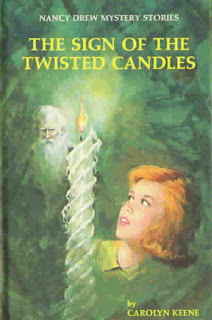
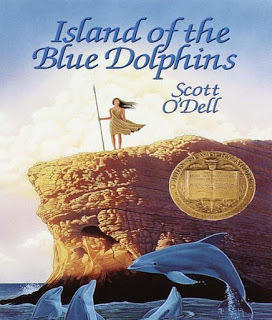
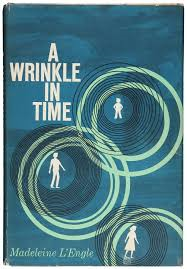
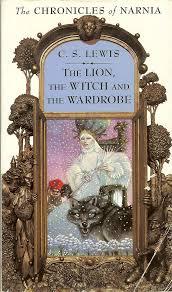




Published on August 05, 2016 11:15
August 3, 2016
Books + Olympics + Imagination = Many Magic Summers
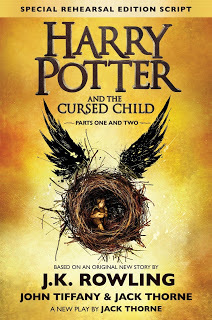 Like most kids, I loved the summer months. Not because of the weather -- because of the FREEDOM.
Like most kids, I loved the summer months. Not because of the weather -- because of the FREEDOM.During the summer, I read whatever books I wanted. The summer I was 14, I walked across the street to our neighbor's yard sale with $25 in my pocket. I came home with empty pockets and a giant box of romance novels -- which, I proceeded to chain-read the rest of the summer.
Not once did my parents say, No, stop! You're not old enough for those books!
Last summer I read all the Harry Potter books for the first time. Today I am reading HARRY POTTER AND THE CURSED CHILD. Summers have always meant books for me. And adventure.
 As one of 5 kids, I never had to look far for a playmate. We had all sorts of contests -- who could swim across the pond the fastest, who could jump the highest on the trampoline. Several summers we hosted our own neighborhood Olympics -- my favorite (and best) event was synchronized swimming (with my sister).
As one of 5 kids, I never had to look far for a playmate. We had all sorts of contests -- who could swim across the pond the fastest, who could jump the highest on the trampoline. Several summers we hosted our own neighborhood Olympics -- my favorite (and best) event was synchronized swimming (with my sister).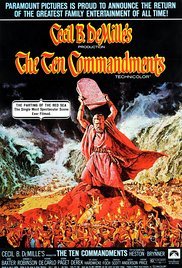 We were of that generation of kids who lived outside all day and only came in when it started getting dark. We invented our own worlds -- my favorite and the most lasting was our version of "Egypt," mostly inspired by multiple viewings of the movie THE TEN COMMANDMENTS. We used trees as forts, the creek as a dividing line between lands, our ponies for transporting needed supplies like blankets and books and snacks, puddles with tadpoles in various stages as our gardens, and above all, we had each other.
We were of that generation of kids who lived outside all day and only came in when it started getting dark. We invented our own worlds -- my favorite and the most lasting was our version of "Egypt," mostly inspired by multiple viewings of the movie THE TEN COMMANDMENTS. We used trees as forts, the creek as a dividing line between lands, our ponies for transporting needed supplies like blankets and books and snacks, puddles with tadpoles in various stages as our gardens, and above all, we had each other.Summers especially we pretty much lived a middle grade novel. When I remember my childhood it is always steamy and sunshiny and my skin is brown and dotted with mosquito bites and/or poison ivy. Maybe that's why none of my middle grade novels include school?!
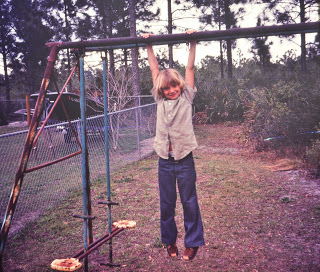
I am so grateful!
-----------------------
Irene Latham is the award winning author of two novels for children LEAVING GEE'S BEND and DON'T FEED THE BOY. She also serves as poetry editor for Birmingham Arts Journal and has published three volumes of poetry for adults. Named the winner of the 2016 International Literary Association-Lee Bennett Hopkins Promising Poet Award, her current focus is on poetry for children. Titles include DEAR WANDERING WILDEBEEST, which was named an SCBWI Lee Bennett Hopkins Poetry Award Honor book, FRESH DELICIOUS: Poems from the Farmers' Market, and WHEN THE SUN SHINES ON ANTARCTICA. irenelatham.com
Published on August 03, 2016 03:30
July 28, 2016
My Wild (Mother) Goose Chase Guest Post By Annabelle Fisher
A rhyme in a pocketA cinnamon curlA secret uncoveredA Mother Goose Girl!
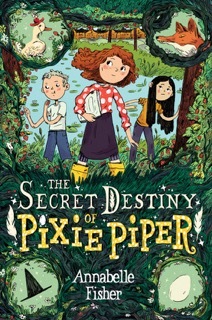 This rhyming prophecy from a fortune-teller in a pointy hat, sets my protagonist Pixie Piper on a quest to find out the truth about her own personal ties to the heritage of Mother Goose. It’s a new take on an old tale; something many other authors have examined. Was Mother Goose French, English, American, or does she go back to ancient Ethiopia? Were her rhymes snippets of lullabies, long lost magical chants, or cleverly disguised political satires?In The Secret Destiny of Pixie Piper, the descendants of Mother Goose, known as the Goose Ladies, are still with us today. When Aunt Doris arrives to recruit Pixie, the fifth grader is resistant, until she learns their mission involves using their rhyming powers to bake wish-granting cakes. Pixie’s a whiz at rhyming, but to become an apprentice, a goose girl must be also be braver than brave and truer than true. To join the family ‘business’, Pixie will have to prove herself.But before I sent Pixie’s version of history out into the world, I felt I owed it to her and to my readers to find some truths. I wanted to research the legacy of the woman sometimes called the ‘Mother of All Rhymes’. Who was she or who was she based upon? How did her rhymes become part of the DNA of so many of us? I know many adults who can easily recite such gems as Humpty Dumpty or Jack and Jill. But their author and her intentions are lost in the mists of history and fantasy. It’s likely that Mother Goose was a sort of everywoman, representing beleaguered, but imaginative women down through the ages who spent time caring for their young. Who among us hasn’t changed the words to an old song or made up a silly rhyme to entertain a child? (Note to fathers: I recognize that you might have done this too.) But where or with whom did the legend originate? One of the first and most interesting sources I found was an article by Joel Benton in The New York Times’s Saturday Review, dated February 4, 1899. Mr. Benton’s objective was to refute the claim that the real Mother Goose was Elizabeth Foster Goose from Boston, whose son-in-law, a printer named Thomas Fleet, “being needy and shrewd thought to turn a penny by noting down the grandmother’s nursery songs and issuing them to the public.” Mrs. Goose is said to have died in 1757 at the age of ninety-two. But Benton’s article points out that no one has been able to find a copy of Fleet’s book, supposedly published in 1719. And even if it had been recovered, Mother Goose’s name and literature was known centuries before that time. Even so, there is a tombstone in the Granary Burying Ground in Boston that is promoted as the burial place of Mother Goose, although instead of Elizabeth Goose, it is Ann, first wife of Fleet’s father-in-law, who is actually buried there.In his Times article, Mr.Benton also quotes an earlier writer-editor, W. H. Whitmore, who wrote notes for Mother Goose’s Melody, issued in 1760 by the London publisher, John Newbury. But that doesn’t mean that Mother Goose was English, either. As Mr. Whitmore observes, Mother Goose may be connected with the legend of eighth century Queen Bertha or Queen Goosefoot (Reine Pedance), the possibly big-footed mother of King Charlemagne of France. But the only known mention of Queen Bertha didn’t occur until 1650 in a publication titled, La Muse Historique by Jean Loret, which contained the phrase, “like a Mother Goose story.” So there’s no definite proof that Mother Goose was French.And that’s not all! In The Annotated Mother Goose, published in 1962, authors William S. Baring Gould and Ceil Baring-Gould, include more prime and not-so-prime suspects, including, yes, the Queen of Sheba!Frustrating? Pretty much. If I couldn’t pin Mother Goose’s rhymes on a single person, being true to her legacy seemed even more of a challenge. The Baring-Goulds attribute many purposes to Mother Goose’s rhymes – to accompany children’s games; to teach letters, numbers and proverbs; as lullabies, love songs, drinking songs; and just-for-fun riddles and tongue twisters. But the authors also acknowledge –somewhat reluctantly – the viewpoint of Katherine Elwes Thomas, author of The Real Personages of Mother Goose, published in 1930. According to Ms. Thomas, “These political satires, written with a merciless keenness of scintillating thrust and bloodletting, in the directness of their lunge at the heart of people and events, embody through many notable reigns the vices and foibles of humanity upon the throne and about the court of England.”Wow! I imagined all of the Mother Gooses rolling in their graves.Thank goodness for the great Mother Goose scholar, Iona Opie, who in her book, Mother Goose’s Little Treasures (published in 2007) refers to herself as “Mother Goose’s self-appointed treasurer.” About the rhymes in that particular collection, Ms. Opie says they are “mysterious fragments from our shared memory: long-ago laughter of little meaning and echoes of ancient spells….These rhymes are a confirmation that though we must live in the real world, we need to know the way to another world where there are no limits and nothing is certain.”I much prefer the world Iona Opie envisions. And that is the world in which I decided to set my story. Doing the research didn’t provide me with answers to my questions about the who or why of Mother Goose, but it gave me something more important –it freed me to create a Mother Goose legacy of my own.What does your Mother Goose legacy include?The Secret Destiny of Pixie Piper by Annabelle FisherGreenwillow BooksAn imprint of HarperCollins PublishersISBN 978-0-06-239377-7www.annabellefisher.com
This rhyming prophecy from a fortune-teller in a pointy hat, sets my protagonist Pixie Piper on a quest to find out the truth about her own personal ties to the heritage of Mother Goose. It’s a new take on an old tale; something many other authors have examined. Was Mother Goose French, English, American, or does she go back to ancient Ethiopia? Were her rhymes snippets of lullabies, long lost magical chants, or cleverly disguised political satires?In The Secret Destiny of Pixie Piper, the descendants of Mother Goose, known as the Goose Ladies, are still with us today. When Aunt Doris arrives to recruit Pixie, the fifth grader is resistant, until she learns their mission involves using their rhyming powers to bake wish-granting cakes. Pixie’s a whiz at rhyming, but to become an apprentice, a goose girl must be also be braver than brave and truer than true. To join the family ‘business’, Pixie will have to prove herself.But before I sent Pixie’s version of history out into the world, I felt I owed it to her and to my readers to find some truths. I wanted to research the legacy of the woman sometimes called the ‘Mother of All Rhymes’. Who was she or who was she based upon? How did her rhymes become part of the DNA of so many of us? I know many adults who can easily recite such gems as Humpty Dumpty or Jack and Jill. But their author and her intentions are lost in the mists of history and fantasy. It’s likely that Mother Goose was a sort of everywoman, representing beleaguered, but imaginative women down through the ages who spent time caring for their young. Who among us hasn’t changed the words to an old song or made up a silly rhyme to entertain a child? (Note to fathers: I recognize that you might have done this too.) But where or with whom did the legend originate? One of the first and most interesting sources I found was an article by Joel Benton in The New York Times’s Saturday Review, dated February 4, 1899. Mr. Benton’s objective was to refute the claim that the real Mother Goose was Elizabeth Foster Goose from Boston, whose son-in-law, a printer named Thomas Fleet, “being needy and shrewd thought to turn a penny by noting down the grandmother’s nursery songs and issuing them to the public.” Mrs. Goose is said to have died in 1757 at the age of ninety-two. But Benton’s article points out that no one has been able to find a copy of Fleet’s book, supposedly published in 1719. And even if it had been recovered, Mother Goose’s name and literature was known centuries before that time. Even so, there is a tombstone in the Granary Burying Ground in Boston that is promoted as the burial place of Mother Goose, although instead of Elizabeth Goose, it is Ann, first wife of Fleet’s father-in-law, who is actually buried there.In his Times article, Mr.Benton also quotes an earlier writer-editor, W. H. Whitmore, who wrote notes for Mother Goose’s Melody, issued in 1760 by the London publisher, John Newbury. But that doesn’t mean that Mother Goose was English, either. As Mr. Whitmore observes, Mother Goose may be connected with the legend of eighth century Queen Bertha or Queen Goosefoot (Reine Pedance), the possibly big-footed mother of King Charlemagne of France. But the only known mention of Queen Bertha didn’t occur until 1650 in a publication titled, La Muse Historique by Jean Loret, which contained the phrase, “like a Mother Goose story.” So there’s no definite proof that Mother Goose was French.And that’s not all! In The Annotated Mother Goose, published in 1962, authors William S. Baring Gould and Ceil Baring-Gould, include more prime and not-so-prime suspects, including, yes, the Queen of Sheba!Frustrating? Pretty much. If I couldn’t pin Mother Goose’s rhymes on a single person, being true to her legacy seemed even more of a challenge. The Baring-Goulds attribute many purposes to Mother Goose’s rhymes – to accompany children’s games; to teach letters, numbers and proverbs; as lullabies, love songs, drinking songs; and just-for-fun riddles and tongue twisters. But the authors also acknowledge –somewhat reluctantly – the viewpoint of Katherine Elwes Thomas, author of The Real Personages of Mother Goose, published in 1930. According to Ms. Thomas, “These political satires, written with a merciless keenness of scintillating thrust and bloodletting, in the directness of their lunge at the heart of people and events, embody through many notable reigns the vices and foibles of humanity upon the throne and about the court of England.”Wow! I imagined all of the Mother Gooses rolling in their graves.Thank goodness for the great Mother Goose scholar, Iona Opie, who in her book, Mother Goose’s Little Treasures (published in 2007) refers to herself as “Mother Goose’s self-appointed treasurer.” About the rhymes in that particular collection, Ms. Opie says they are “mysterious fragments from our shared memory: long-ago laughter of little meaning and echoes of ancient spells….These rhymes are a confirmation that though we must live in the real world, we need to know the way to another world where there are no limits and nothing is certain.”I much prefer the world Iona Opie envisions. And that is the world in which I decided to set my story. Doing the research didn’t provide me with answers to my questions about the who or why of Mother Goose, but it gave me something more important –it freed me to create a Mother Goose legacy of my own.What does your Mother Goose legacy include?The Secret Destiny of Pixie Piper by Annabelle FisherGreenwillow BooksAn imprint of HarperCollins PublishersISBN 978-0-06-239377-7www.annabellefisher.comANNABELLE’S BIO
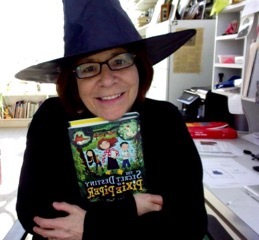 Annabelle Fisher is the author of The Secret Destiny of Pixie Piper, which reviewers have called, “entertaining,” “fresh,” “creative,” and “pretty darn charming.” She’s taught courses in writing middle grade and young adult literature in the Graduate Creative Writing Department of Manhattanville College, as well as writing workshops for kids, teens, and adults. She lives in Westchester County, New York, not too far from where the Headless Horseman roams at night.
Annabelle Fisher is the author of The Secret Destiny of Pixie Piper, which reviewers have called, “entertaining,” “fresh,” “creative,” and “pretty darn charming.” She’s taught courses in writing middle grade and young adult literature in the Graduate Creative Writing Department of Manhattanville College, as well as writing workshops for kids, teens, and adults. She lives in Westchester County, New York, not too far from where the Headless Horseman roams at night.
Published on July 28, 2016 04:00
July 25, 2016
AUGGIE AND THE END OF SUMMER (THE JUNCTION OF SUNSHINE AND LUCKY / HOLLY SCHINDLER)
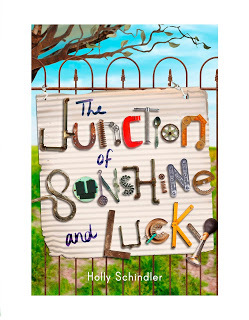
THE JUNCTION OF SUNSHINE AND LUCKY starts as Auggie's summer is winding down. In fact, it starts on the very last day of summer, as Auggie and her friends are preparing for the fifth grade in a new school (their old school was torn down and the students have been redistricted).
Auggie's excitement over the impending school year leads to one of my favorite passages in the book:
All summer, everyone's been saying "Dickerson," the name of my new school, the same way that they say, "Ooooh. Double chocolate truffle cake." Like it's something they all wish they could sink their teeth into. And a special school is the perfect place for a girl like me to finally find her special-something. Thinking about it makes a smile break out inside me.
The way I figure it, there are two kinds of people in this world--people who shine like the chrome on Old Glory [Grampa Gus's truck], and people who are more like the rusted metal in McGunn's [junkyard]. My entire life, I've been surrounded by people who shine, who have a special-something. And starting tomorrow, I'm going to find mine.
Published on July 25, 2016 05:00
July 22, 2016
Reading Undercover: Smack-Dab-in-the-Classroom by Dia Calhoun
When I was a kid, reading undercover increased in the summer. It also required greater dedication.
With school out, I read whatever I wanted in great gulps (if only we could supersize reading instead of sodas). By bedtime, I was always, always, always at a place in the book where I simply could not stop reading. And so the book, flashlight, and I all disappeared under the covers. Covers that hid that tell-tale light from snooping parental units.
Yes, this happened all year round. But in the heat of summer, blankets were stifling. A mere sheet revealed too much light. And so I had a choice: would I be breathless for air or breathless for story?
The story always won.
With school out, I read whatever I wanted in great gulps (if only we could supersize reading instead of sodas). By bedtime, I was always, always, always at a place in the book where I simply could not stop reading. And so the book, flashlight, and I all disappeared under the covers. Covers that hid that tell-tale light from snooping parental units.
Yes, this happened all year round. But in the heat of summer, blankets were stifling. A mere sheet revealed too much light. And so I had a choice: would I be breathless for air or breathless for story?
The story always won.
Published on July 22, 2016 22:00
Summer in Gettysburg by Laurie Calkhoven
I realized in trying to come up with something for the summer theme that weather rarely plays a role in my books. Unless it's an extreme weather situation, I don't mention weather. But here's a short piece from WILL AT THE BATTLE OF GETTYSBURG, 1863:
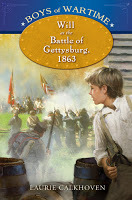 About ten thirty, more infantry soldiers marched down Washington Street, heading for the battle. I had forgotten all about going home. Instead I perched on the plank fence around Mrs. Eyster's Young Ladies Seminary to cheer them on.
About ten thirty, more infantry soldiers marched down Washington Street, heading for the battle. I had forgotten all about going home. Instead I perched on the plank fence around Mrs. Eyster's Young Ladies Seminary to cheer them on.
Their uniforms were the thickest kind of wool. Most men had wool blankets and knapsacks belted to their backs. Cartridge boxes and canteens hung over their shoulders. They had been caught in the rain and dripped water and sweat in the hot July weather.
They marched on the double-quick through rows of townspeople handing them cake and bread with apple butter and water. The men would grab a tin cup, drink, and fling it back as they ran.
They didn't have the easy confidence of the cavalry from the day before. These men were headed into battle. We could hear the shells thundering, the muskets popping. Some of these men would die today. They knew it. Now I did, too.
Officers urged the people to stop feeding them--we were slowing the soldiers down--but no one wanted to send them into battle without food and water and shouts of encouragement. It was the only thing we could do.
"There are enough soldiers here to whip all the Rebs in the South," Albertus McCreary yelled.
My stomach was beginning to fill with dread, but I pretended to share his excitement. "I bet the war ends today," I said. "And we'll win it!"
 About ten thirty, more infantry soldiers marched down Washington Street, heading for the battle. I had forgotten all about going home. Instead I perched on the plank fence around Mrs. Eyster's Young Ladies Seminary to cheer them on.
About ten thirty, more infantry soldiers marched down Washington Street, heading for the battle. I had forgotten all about going home. Instead I perched on the plank fence around Mrs. Eyster's Young Ladies Seminary to cheer them on.Their uniforms were the thickest kind of wool. Most men had wool blankets and knapsacks belted to their backs. Cartridge boxes and canteens hung over their shoulders. They had been caught in the rain and dripped water and sweat in the hot July weather.
They marched on the double-quick through rows of townspeople handing them cake and bread with apple butter and water. The men would grab a tin cup, drink, and fling it back as they ran.
They didn't have the easy confidence of the cavalry from the day before. These men were headed into battle. We could hear the shells thundering, the muskets popping. Some of these men would die today. They knew it. Now I did, too.
Officers urged the people to stop feeding them--we were slowing the soldiers down--but no one wanted to send them into battle without food and water and shouts of encouragement. It was the only thing we could do.
"There are enough soldiers here to whip all the Rebs in the South," Albertus McCreary yelled.
My stomach was beginning to fill with dread, but I pretended to share his excitement. "I bet the war ends today," I said. "And we'll win it!"
Published on July 22, 2016 03:16
July 18, 2016
Vacation? What Vacation? (July theme) by Claudia Mills
When I pondered our theme this month, summer vacations seen through a character's eyes, I realized that in all the 57 books for young readers that I've published so far in my life, I have taken a character on vacation exactly once, and that was in a book published in 1983.
Wow.
Part of why I never write about vacations is that I specialize in school stories, and well, school is precisely when vacation isn't happening. But I also don't write about vacations because, heretical as this may seem, I don't really like vacations. Depending on how you define "vacation," it's been almost ten years since I've taken one. If a "vacation" is a trip taken just for fun, with no component of work or family obligation, my last was in 2007.
I've come to realize that I'm happiest when I have work combined with play, and play combined with work. I adore getting invited to give a talk at a conference and then savoring all the pleasures of the conference city while I'm there. I'm even happier if I can connect with old, dear friends on the trip or bring a family member along with me. My passion for productivity makes it the case that I really do feel most satisfied if I'm writing while I'm traveling, or researching a book, or giving a talk, or something. Just to stroll around aimlessly looking at stuff? It doesn't thrill me the way that multi-layered trips do.
So here I am, writing on the Great Wall of China on a trip in 2013, where I went to give a talk at a conference of American and Chinese children's literature scholars sponsored by Ocean University in Qingdao.
 It wasn't a "vacation," but as far as I'm concerned, trips don't get much better than this.
It wasn't a "vacation," but as far as I'm concerned, trips don't get much better than this.
Wow.
Part of why I never write about vacations is that I specialize in school stories, and well, school is precisely when vacation isn't happening. But I also don't write about vacations because, heretical as this may seem, I don't really like vacations. Depending on how you define "vacation," it's been almost ten years since I've taken one. If a "vacation" is a trip taken just for fun, with no component of work or family obligation, my last was in 2007.
I've come to realize that I'm happiest when I have work combined with play, and play combined with work. I adore getting invited to give a talk at a conference and then savoring all the pleasures of the conference city while I'm there. I'm even happier if I can connect with old, dear friends on the trip or bring a family member along with me. My passion for productivity makes it the case that I really do feel most satisfied if I'm writing while I'm traveling, or researching a book, or giving a talk, or something. Just to stroll around aimlessly looking at stuff? It doesn't thrill me the way that multi-layered trips do.
So here I am, writing on the Great Wall of China on a trip in 2013, where I went to give a talk at a conference of American and Chinese children's literature scholars sponsored by Ocean University in Qingdao.
 It wasn't a "vacation," but as far as I'm concerned, trips don't get much better than this.
It wasn't a "vacation," but as far as I'm concerned, trips don't get much better than this.
Published on July 18, 2016 04:00
July 15, 2016
Take Your Character on Vacation (July Theme by Naomi Kinsman)
For most of us, summer offers the opportunity to live a little differently. Whether for a week or a month, vacations invite us to try things we wouldn't normally try. We can learn a lot about ourselves--noticing the way we engage with new experiences.
This summer, my family took a trip to Bend, OR. During our week away, we boated, hiked, and even visited a mountain climbing gym. The mountain climbing was particularly interesting because it was a new activity for most of our family. We each handled it a little differently. Our approaches to the challenges posed by the climbing walls revealed a lot about our temperaments and personalities. How persistent were we? What goals did we set or not set for ourselves? Did we step back and watch or dive in first? When fear cropped up, did we push past it, pause, or panic?
This summer, I'm revising a novel I drafted during a recent NaNoWriMo. While the fast drafting gave me strong insight regarding plot, my characters still need development. Rather than forcing a revision, I've been writing around the edges of the book, giving my characters room to develop. One strategy I've tried is to write about my characters' ordinary lives, writing scenes that place them in regular situations. This approach has definitely helped me see how they behave from day to day.
However, while thinking about my experiences on vacation, I realized that putting my characters in extraordinary situations might provide key insight. Stories, after all, aren't about ordinary experiences. As writers, we need to know how our characters normally face challenges. Then, when the story pushes our character beyond the ordinary, we have a baseline and can show the character's growth from that point.
Maybe you're writing a story this summer, too. If so, I'd highly recommend you experiment with taking your characters on vacation. How will they react to the adventures offered?
This summer, my family took a trip to Bend, OR. During our week away, we boated, hiked, and even visited a mountain climbing gym. The mountain climbing was particularly interesting because it was a new activity for most of our family. We each handled it a little differently. Our approaches to the challenges posed by the climbing walls revealed a lot about our temperaments and personalities. How persistent were we? What goals did we set or not set for ourselves? Did we step back and watch or dive in first? When fear cropped up, did we push past it, pause, or panic?
This summer, I'm revising a novel I drafted during a recent NaNoWriMo. While the fast drafting gave me strong insight regarding plot, my characters still need development. Rather than forcing a revision, I've been writing around the edges of the book, giving my characters room to develop. One strategy I've tried is to write about my characters' ordinary lives, writing scenes that place them in regular situations. This approach has definitely helped me see how they behave from day to day.
However, while thinking about my experiences on vacation, I realized that putting my characters in extraordinary situations might provide key insight. Stories, after all, aren't about ordinary experiences. As writers, we need to know how our characters normally face challenges. Then, when the story pushes our character beyond the ordinary, we have a baseline and can show the character's growth from that point.
Maybe you're writing a story this summer, too. If so, I'd highly recommend you experiment with taking your characters on vacation. How will they react to the adventures offered?
Published on July 15, 2016 22:41
July 14, 2016
A Long Hot Summer (A Character's Perspective) by Bob Krech
The first thing I thought about…when those black guys got shot by the cops at those traffic stops…and I’m not proud to admit it…but the first thing I thought about was, how is this going to affect the team?
We’ve already got black guys with us who aren’t necessarily crazy about white people and now this? Plus the guys outside the team at school who’ve never been happy with any white guys. And since it’s summer and we’re all in our own neighborhoods, and not really seeing each other or anything, it makes me wonder what’s everybody thinking? I mean, I know what people here in Greenville are thinking–– and it’s not good. We have plenty of cops living over here.
It’s over in Lincoln Park that I’m wondering about. What are Al and Winnie and all of them thinking?
The more mature or whatever part of me thinks that with what’s going on, I should be worried about the big picture. People protesting all over and now cops getting shot. Instead I keep thinking about us. Our team. Is it all gonna be normal when we get together to play summer league next week? Our nine black guys and six white guys. Is it going to do anything to us?
But maybe that’s what I should be worried about, because that’s where it’s all going to come home and not just be something on the news. That’s where maybe I can actually do something about it.
-Ray W. (from REBOUND)
Published on July 14, 2016 23:30



